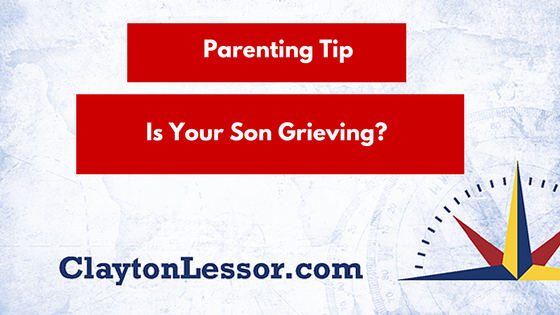Parenting Tip: Is Your Son Grieving?

Is Your Son Grieving a Loss?
There are many definitions of grief, the one I like best is by The Grief Recovery Institute:
“Grief is the normal and natural emotional reaction to loss or change of any kind. Of itself, grief is neither a pathological condition nor a personality disorder. Grief is the conflicting feelings caused by the end of or change in a familiar pattern of behavior.”
The death of a loved one is only ONE of the many reasons we grieve. Is your son grieving the loss of a good friend? A break up with his girlfriend? Did the family pet die? If there has been a divorce, he may be grieving a parent.
Grief is part of life, an emotion to recognize, embrace and work through. Keep in mind we all grieve differently, some wear their emotions on their sleeve and others internally. There is not a right or wrong way to grieve. With adolescent boys, they are more likely to keep their feelings buried deep inside. That is not only unhealthy but delays the grieving process and can lead to self-medicating or avoidance.
The 5 Stages of Grief
The five stages are listed here in no particular order; that is because “the order” is different for everyone!
- Denial and isolation
- Anger
- Bargaining (the “if only” statements)
- Depression
- Acceptance
You Don’t Have to Fix It
The best thing to do is allow your son to feel his feelings as they come over him. Suggest a safe place and suggest deep breaths. Let him know it’s okay to cry. Tears are the body’s way of releasing sadness, we (counselors) call them cleansing tears. Each time he allows his tears to leave his body he will be that much lighter with sadness and grief.
The good news is we don’t grieve the same piece (stage) twice. However, if delayed or interrupted grief can be “piled up” and become a major factor in other disorders.
Ultimately, if he doesn’t deal with it he only prolongs the healing process.
Don’t Rush the Process
Encourage him to take the time to feel it, let it out whether it is anger, sadness or acceptance. As difficult as this is, it’s important to honor the process.
My guess is he won’t “seem” to appreciate this part; in my experience with adolescent boys, they like to put up a brave front. In his own time and space, maybe sitting on the edge of his bed he’ll recall your words of encouragement.
Is your son struggling with grief? Do you have comments to share? Visit our Facebook page.

Thank you for this – sharing in my online group for parents!
I appreciate that! Glad you feel it is helpful.